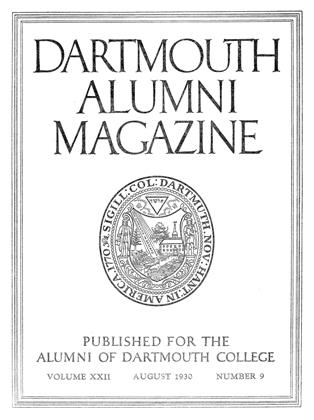At the baccalaureate service held in Rollins Chapel, June 15, the Reverend Benjamin 5,000.00 Washburn '07 delivered the baccalaureate sermon and President Hopkins gave his valedictory address to the graduating class. Dr. Washburn, who received the honorary degree of Doctor of Divinity last year, is rector of Emmanuel Church, Boston. His subject was "Prophets Not Without Honor." President Hopkins's valedictory follows: Men of 1930: The formal processes of the cultural 15, 000 00 college are designed far more specifically for creating a habit of mind than for transmitting what at the moment may seem to be the exact 5 000 00 details of knowledge. In these final days of your enrollment as undergraduates, we who 15 100 68 are solicitous that abundance of life may be yours crave most of all for assurance that amid the problems of life you shall have not 10 000 00 only the ability butthe will for reflective thought and clear thinking. The college purpose is far more concerned with the sincerity of your desire to think straight, and with your mental equipment for doing so, than with the exact forms of the conclusions to 7,717.02 which these attributes lead you. 5,950.00 This traditional service in which we are participating in the Commencement exereiges 5,922.28 symbolizes the spirit which actuated the founders of our historic colleges in New England. They believed that human life uninfluenced 5,018.52by religious conviction was incomplete. They believed that unintelligence in 5,300.00 religion was dangerous as elsewhere. In these few hours which precede change in our mutual relationships, certain conditions 4,000.00 can well be recognized which perhaps could less clearly be distinguished while attitudes of 3,200.00 all-embracing wisdom on the part of college authorities, or of intellectual posing on the part of undergraduates, seemed inseparable from our common life. The institutional college of the present day is without any such certainty of assurance as in the days of its founding of how to develop and how to nourish a religious spirit within the minds of its student body. Meanwhile, the conditions of American life have so changed that undergraduates in the main come to the college without any acquaintanceship with what religion really is, except in some of its superficial forms. Judged on the basis of these forms, religion appears unattractive and the undergraduate body becomes indifferent if not actually resistant to any formal attempt to approach it helpfully in clarification at this point. The present is not a time for discussion of why these things are so. Acknowledgment of the fact, however, is important as bearing on how henceforth in our selfdirected efforts well-rounded lives are to be lived, and as bearing on what habits of mind will be most conducive to living such lives.
The religious impulse is to be found most purely in the spirit which animated Jesus, the great Teacher, and not in the corrupted ideals of his self-appointed or unintelligent interpreters, far remote from him in thinking and in time. The resounding din of organization, the hysterical activities of political propaganda, the quarrelsome conduct of advocates of exact theological definitions, the confused counsels of social reform, are not the sources from which to seek either the comfort or the inspiration of a devotional relationship between man and God. As Elijah in days of old, seeking to know God, found him not in the great and strong wind which rent the mountains and broke in pieces the rocks, nor in the earthquake, nor in the fire, but in the still, small voice, so today God most surely may be found in the reverence of the reflective mind and in the sensitiveness of the willing spirit.
God grant these college years may have given hearing to our minds!
 View Full Issue
View Full Issue
More From This Issue
-
 Article
ArticleMy Love for Languages
August 1930 By Dr. James A.Spalding '66 -
 Class Notes
Class NotesCLASS OF 1929
August 1930 By Frederick W. Andres -
 Lettter from the Editor
Lettter from the EditorEditorial Comment
August 1930 -
 Article
ArticleMidsummer Musings
August 1930 By Phil Sherman -
 Article
ArticleDebating at Dartmouth
August 1930 By E. V. Simrell, Faculty Advisor -
 Article
ArticleAgain Among the Hills
August 1930 By Arthur Dewing








